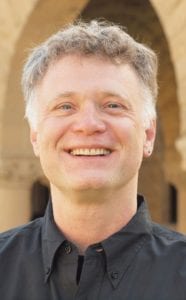
Director, Outreach Activities
Department of Genetics, School of Medicine, Stanford University
ASHG: What non-scientific skills (communication, artistry, athleticism, etc.) are important for your job? Were any of these skills unexpected assets for you?
Dr. Starr: It turns out that making good analogies is an important part of science communication. And surprisingly, watching lots of TV shows and movies, reading lots of books, and just generally living life provided the fodder I needed to make great analogies. These life experiences are especially important for writing.
Another important skill is being able to tell a story logically from start to finish without too many detours. I picked this skill up from my postdoc adviser who gave great science talks and who made sure everyone came out of his lab a great speaker too.
ASHG: If you could go back to when you were a trainee, what is one piece of advice you would give yourself for your current career?
Dr. Starr: Spend the time to become a good writer. This is something I definitely did not do either in grad school or during my postdoc and it meant a steep learning curve once I got out. The great thing about this advice is that good writing is an invaluable skill no matter what career path you choose.
ASHG: What are your favorite and least favorite parts of your job?
Dr. Starr: The favorite part of my job is watching that light bulb go off in people when they get something. This can either be a graduate student who struggled communicating science but now after some training makes that transition and can now joyfully explain genes to a third grader, or seeing that third grader’s eyes light up when, after playing a game, they now understand how natural selection works. This is such a rush!
The least favorite part of my job is probably answering people’s science misconceptions over and over. It can sometimes seem like I am not making any headway in convincing people that vaccines don’t cause autism or that the Earth is not 6000 years old. Until I do sway someone of course, which then makes it all worthwhile.
Want more interviews? Join the ASHG Trainee Forum to keep up with new ones!
